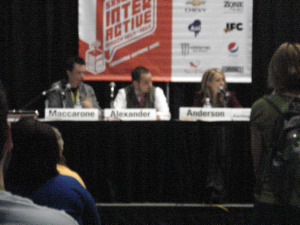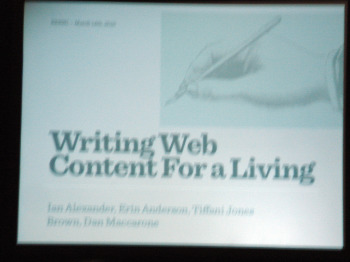
Web writing specialists Erin Anderson (Brain Traffic), Tiffani Jones (thingsthatarebrown LLC), Ian Alexander (Eat Media), and Dan Maccarone (Four Square) presented tips, ideas, and guidelines for web-optimized writing in their interactive panel, “Writing Web Content for a Living.” The panelists began by defining web writing as follows:
Ian Alexander: Web writing is more than just copywriting – it’s storytelling. Accordingly, the web author must know which medium (text, photo, video, etc.) or combination thereof is appropriate to convey the right message. Picking the right vehicle is crucial in telling the story.
Erin Anderson: Web writing entails thinking of the anatomy of the writing itself. There are many moving pieces. Writing for the web is very unforgiving, as the writer is addressing an impatient audience. Internet readers are in a hurry, and the author must keep that in mind.
Dan Maccarone: The web writer should not ignore the overall presentation. The writing is still part of design, still part of user experience. “You need to know when enough is enough. Don’t overdo it.”
Panel moderator Tiffani Jones added, “The best way to get results is to collaborate. Don’t wall yourself off.”
And that was certainly the main idea to be taken from the discussion. All four panelists emphasized the importance of working together to maximize efficiency and deliver the best product. Content strategy, the key to online success, is a process of interaction between copywriters, designers, programmers, and anyone else who may be involved in creating content. Writing web content for a living is all about collaboration, and these four panelists collaborated quite nicely in delivering that message.


Permalink
I absolutely would have to agree with Erin Anderson. I have noticed more and more lately that I am becoming impatient when searching for information on the internet when it is covered in so much additional information. I also like the way Dan Maccarone said “know when enough is enough”. As I have been writing on my blog site I noticed that some of my posts tend to go on for a while. It just makes me wonder am I writing too much or am I just being over passionate about some of the things I write about.
That would probably be my biggest question is, how can one decipher what is too much? How do you know when you have covered what it is you are trying to say and when you are just throwing in added details that most people might not care about?
Permalink
I am having a hard time adding content to my first Web site. Did the panel have any tips for people who are the sole designer/writer/webmaster?
Did Ian Alexander elaborate on how to decide which medium or combination is best for what you are doing?
Permalink
The fast paced flow of information online is both a blessing and a curse. It’s easy to get information as soon as it is available, but sometimes journalistic quality is sacrificed for immediacy. I find typos in news posts all of the time, especially when it is a breaking news story. I don’t think that a story is ever important enough to sacrifice good writing and storytelling.
It’s fascinating to think about how Web writing has evolved in such a short time. Instead of reading long wordy paragraphs, people are now writing for the Web with shorter paragraphs and pictures, links, videos, and interactive elements. What do you think is the next step in the evolution of Web writing?
Permalink
I do agree with Erin Anderson on her comment that blog readers are very impatient. I know that when I go to my favorite blogs I expect there to be new content each time I check, even if I check every 2 minutes.
My question for Erin is how do learn to cram so much information into a small space without having to throw away your creative voice? How do keep your craft without it turning into “just the facts”.
Permalink
It’s true that an internet audience is an impatient, demanding, and sometimes fickle one. To appease the masses you must put out your best work, and very few can do that while working alone. At least, not while expecting to make a living at it.
Permalink
I use the internet to get information, weather, get news, among other things. I also agree that the internet audience is impatient. There are times that I check my email several times an hour waiting for a response to my email or blog posts. I have noticed typos when a news articles on major news sites like Abcnews.com or MSN. The news is important, but mistakes often cheapen the quality of good writing and journalism. Maybe the editors were not paying much attention because they felt they had to beat their competitors to post the article the fastest?
I like websites often include other links, articles, and videos to the pages. This allows the user to get more information and get other perspectives on the topic. I have seen pages full of disorganized information with links that do not work…not very user friendly. I agree with Tiffani Jones said about collaboration. I have found some of the best work such as news articles and videos come from people who collaborate. Two heads are better then one when it comes to large projects and especially when that work is going to be seen by a large audience. Question, what have been the best and worst projects the panelists have ever worked on?
Permalink
It amazes me that people are making themselves known and are making a living by writing content for the web. Perez Hilton (I doubt he’s what the panel intended) became famous for his blogging. News outlets are hiring people to blog and research topics as a supplementary content. Editors and writers are blogging as well.
I agree with the other comments in finding myself impatient when reading blogs. It can sometimes be a challenge to finish reading one. It’s distracting when the blogs and news articles have weak grammar and typos. I want to work as a copy editor when I graduate, but I hear from those in the industry that it hasn’t quite been figured out where a copy editor’s place is. Copy editors are trained to think of the reader/audience. Yes, blogging allows a writer to use more “voice,” but I think a copy editor keeps a writer honest in making sure there are has sources and should be part of that collaboration Marie mentioned.
Permalink
I just recently started a blog on WordPress, and I think that the biggest problem I am having is coming up with topics that I think readers will find interesting. I think that I am stuck in the braodcast or print format of writing. I feel completely separated from my audience. Did the speakers mention anything about how they continue to have original ideas? I am sure that on the Web it is nearly impossible.
I only update my blog once a week. Once I get the hang of it more, I would like to post everyday. I am worried, though. If I am already having writers block when I have only written 6 or 7 posts, how can I expect to be able to post daily? I have had trouble finding a topic that I am knowledgeable enough about to have important insights everyday.
Permalink
This post contains some interesting content. I never thought about the instant gratification aspect for the creators of websites. I mean, I never thought about that as an deterrent to the job. Since it was said it makes total sense to me.
The most interesting thing I gathered from the post was the don’t block yourself off, and collaboration is the most important aspect to creating a good page. I mean I see this as from when I ended up getting help with my blog itself. I think that should be the biggest thing that anyone takes out of the post.
Permalink
For me, writing meaningful, interesting and useful web content is a daunting task. After seeing the movie Julie & Julia, I had a desire to start a blog that could change the world, or a least a few people’s lives. This then led to the creation of a WordPress account, which has remain untouched for the past, um, 3 months.
I think the elephant in the room is how do you, as the author, decide what’s good web content? Writing a blog post is completely different than writing an article for a newspaper, so how do you successfully separate yourself from print journalism in order to write good web content?